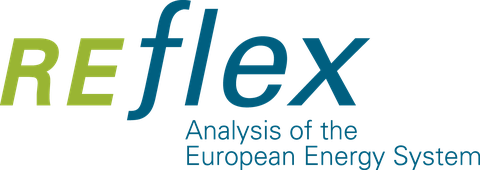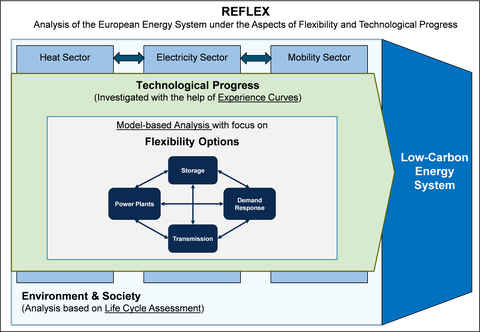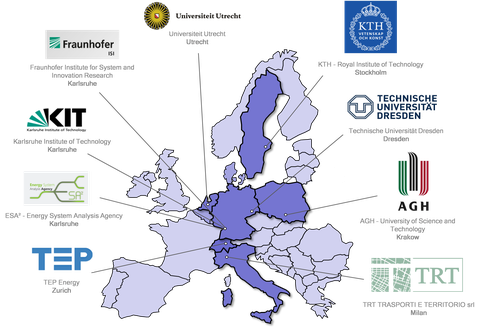REFLEX
Analysis of the European Energy System under the Aspects of Flexibility and Technological Progress
Objective
The future energy system is challenged by the intermittent nature of renewables and thus requires a variety of different flexibility options. Still, the interaction between possible solutions, the optimal portfolio of flexibility options and their impact on environment and society are unknown. It is hence the core objective of REFLEX to analyse and evaluate the development towards a low-carbon energy system with focus on flexibility options in the European Union until the year 2050 to support the implementation of the SET-Plan. The intended analyses are based on a modelling environment that considers the full extent to which current and future energy technologies and policies interfere and how they affect the environment and society while considering technological learning of low-carbon and flexibility technologies.
This core objective is further broken down into a set of sub-goals:
- Analysing and modelling the impacts of technological development and innovation on the energy system by enhancing and combining different sectoral approaches and experience curves.
- Developing an Energy Models System (EMS), which links different models and approaches, including a common database and interface to analyse the complex interactions and interdependencies between the different actors, the available technologies and the impact of the different interventions on all levels from the individual to the whole energy system.
- Devising experience curves for energy technologies and incorporate them in the EMS to assess the future competitiveness of upcoming technologies and their diffusion into the system as well as their interferences with existing technologies, including grid aspects.
- Comparative assessment of prospective flexibility portfolios to integrate RES-based electricity generation, considering demand side management, grid reinforcement, energy storage, flexible generation capacities and alternative electricity market designs as well as their impacts.
- Modelling and assessment of technology policy measures of the SET-Plan by applying techno-economic learning methods for innovative technologies while considering socio-economic parameters from empirical data surveys.
- Simulation of the effectiveness of current energy policy legislation (e.g. of the Energy Efficiency Directive) and identification of the need for additional policies to comply with the 2050 target.
- Quantification of external costs and socio-environmental impacts of whole energy system transition pathways, considering the entire life cycle of new and existing energy technologies (e.g. CCS or transmission lines) .
- Provide model based decision support tools for the different actors and sectors in the energy system as well as derive an indicator set for a comprehensive sector integrating assessment.
Contribution of the Chair of Energy Economics
The researchers from the chair of energy economics assess the deployment and the trade-off between different technologies in the electricity sector with focus on flexibility options. One task will be the qualitative techno-economic assessments of key technologies for system flexibility. This will deliver a systematically structured overview on flexibility options for system integration of renewable energies. For this purpose, several components will be newly incorporated in ELTRAMOD, such as endogenous investments in key technologies for flexibility options based on experience curves. ELTRAMOD will be performed to analyse the penetration of different flexibility options and their contribution to RES integration in the electricity sector. Furthermore, crucial flexibility measures for achieving the transformation towards a low-carbon electricity system and supporting policy recommendations will be identified.
In addition, the chair of energy economics will lead and coordinate the entire project.
Financing / Project Executing Organisation
European Union’s Horizon 2020 research and innovation programme under grant agreement No 691685
Project Partners
REFLEX brings together the comprehensive expertise and existing competences of known experts (from 6 European countries) in the research fields fundamental energy system modelling (heat, mobility and electricity sector), techno-economic assessment as well as environmental and social life cycle assessment.
Duration
05/2016 to 04/2019
Link
Project Meetings and Events
- 18.06.2019 >REFLEX 2. Review Meeting with the European Commission in Brussels, Belgium
- 04.04.2019 REFLEX Project Meeting in Brussels, Belgium
- 03.04.2019 REFLEX Stakeholder Workshop in Brussels, Belgium
- 18.02.2019 REFLEX Project Meeting in Zurich, Switzerland
- 22.10.2018 REFLEX Project Meeting in Milan, Italy
- 08.05.2018 REFLEX Project Meeting at AGH University in Krakow, Poland
- 31.01.2018 >REFLEX Project Meeting in Brussels, Belgium
- 30.01.2018 >REFLEX 1. Review Meeting with the European Commission in Brussels, Belgium
- 08.11.2017 REFLEX Expert Workshop in Karlsruhe, Germany
- 23.05.2017 REFLEX Project Meeting at KTH University in Stockholm, Sweden
- 17.11.2016 REFLEX Public Workshop in Brussels, Belgium
- 31.08.2016 >REFLEX Project Meeting in Utrecht, The Netherlands
- 10.05.2016 >REFLEX-Kick-Off-Meeting in Dresden, Germany
Contact Details at the Chair of Energy Economics
| Steffi Schreiber, Tel.: +49 351 463 39682, Email: Steffi.Schreiber@tu-dresden.de |
| Dominik Möst, Tel.: +49 351 463 39770, Email: Dominik.Möst@tu-dresden.de |



